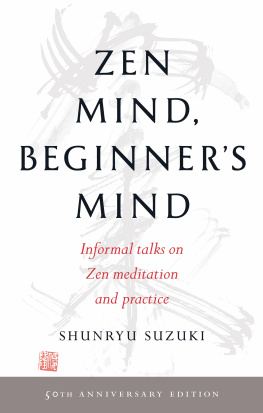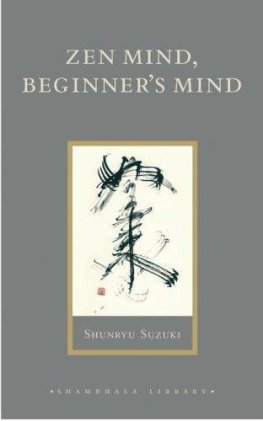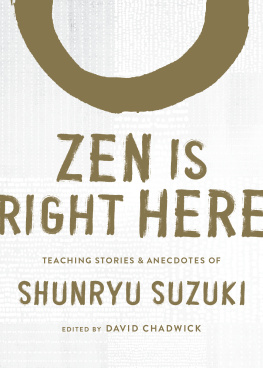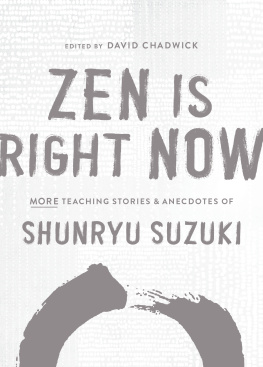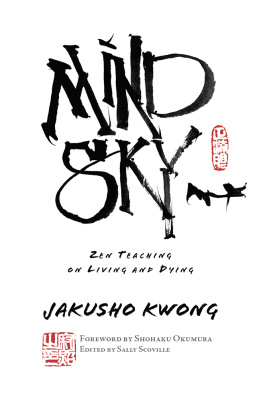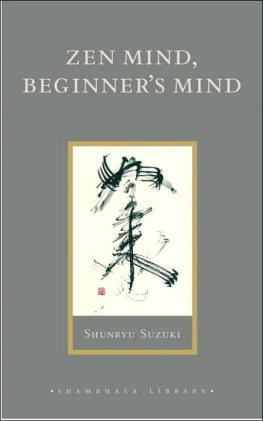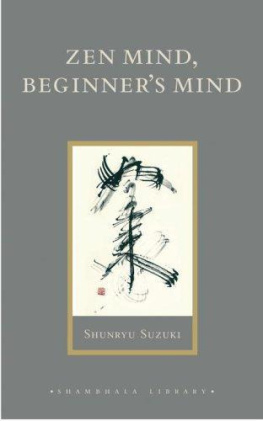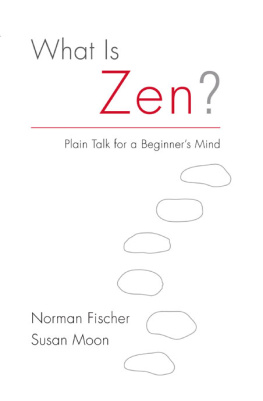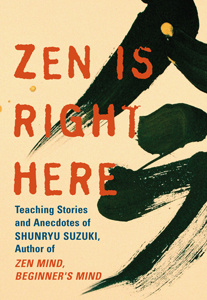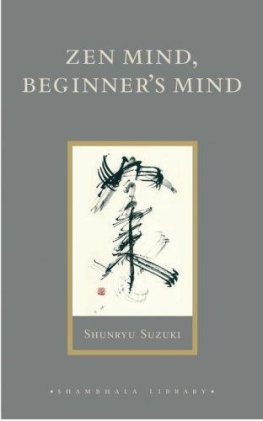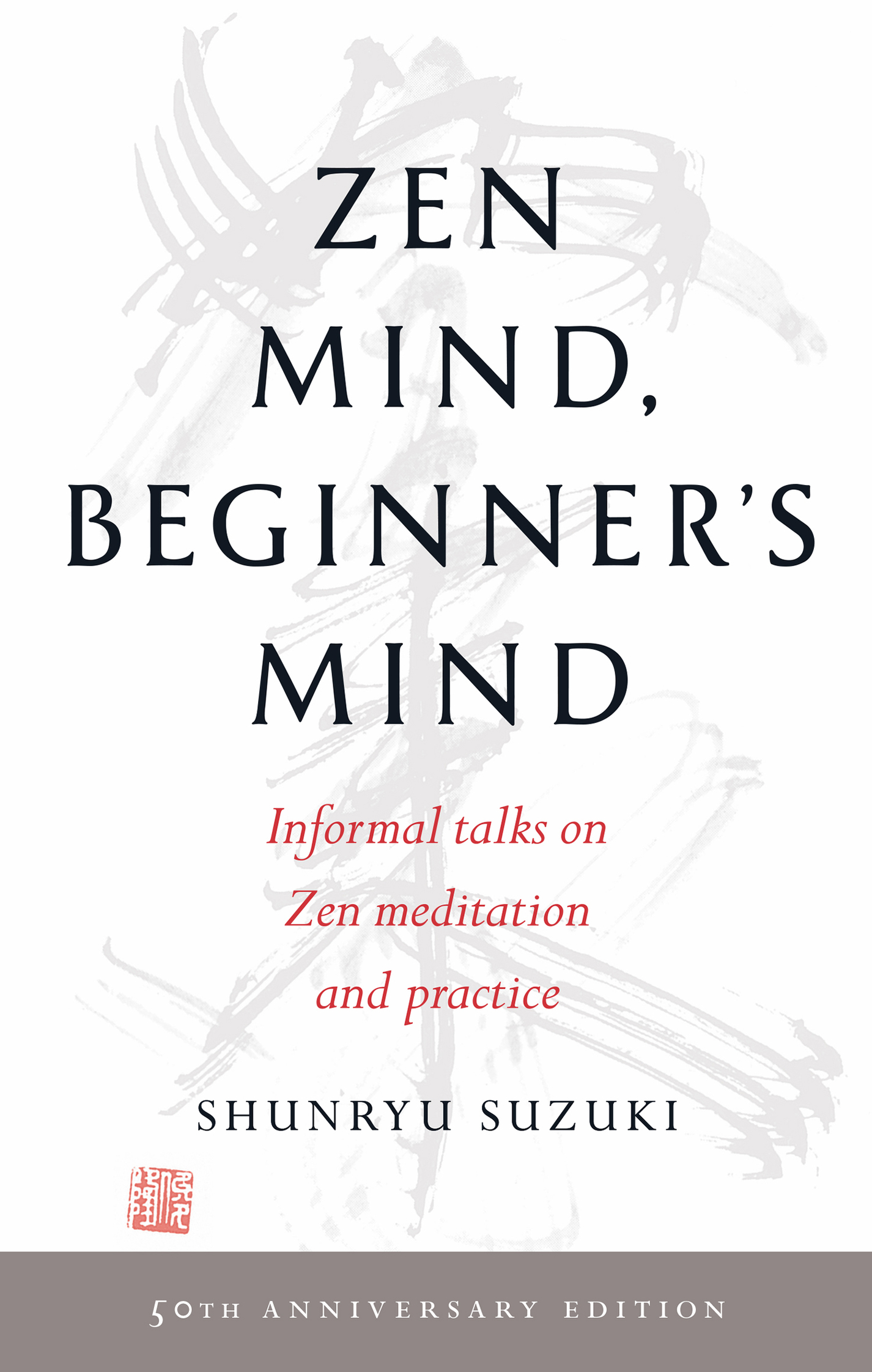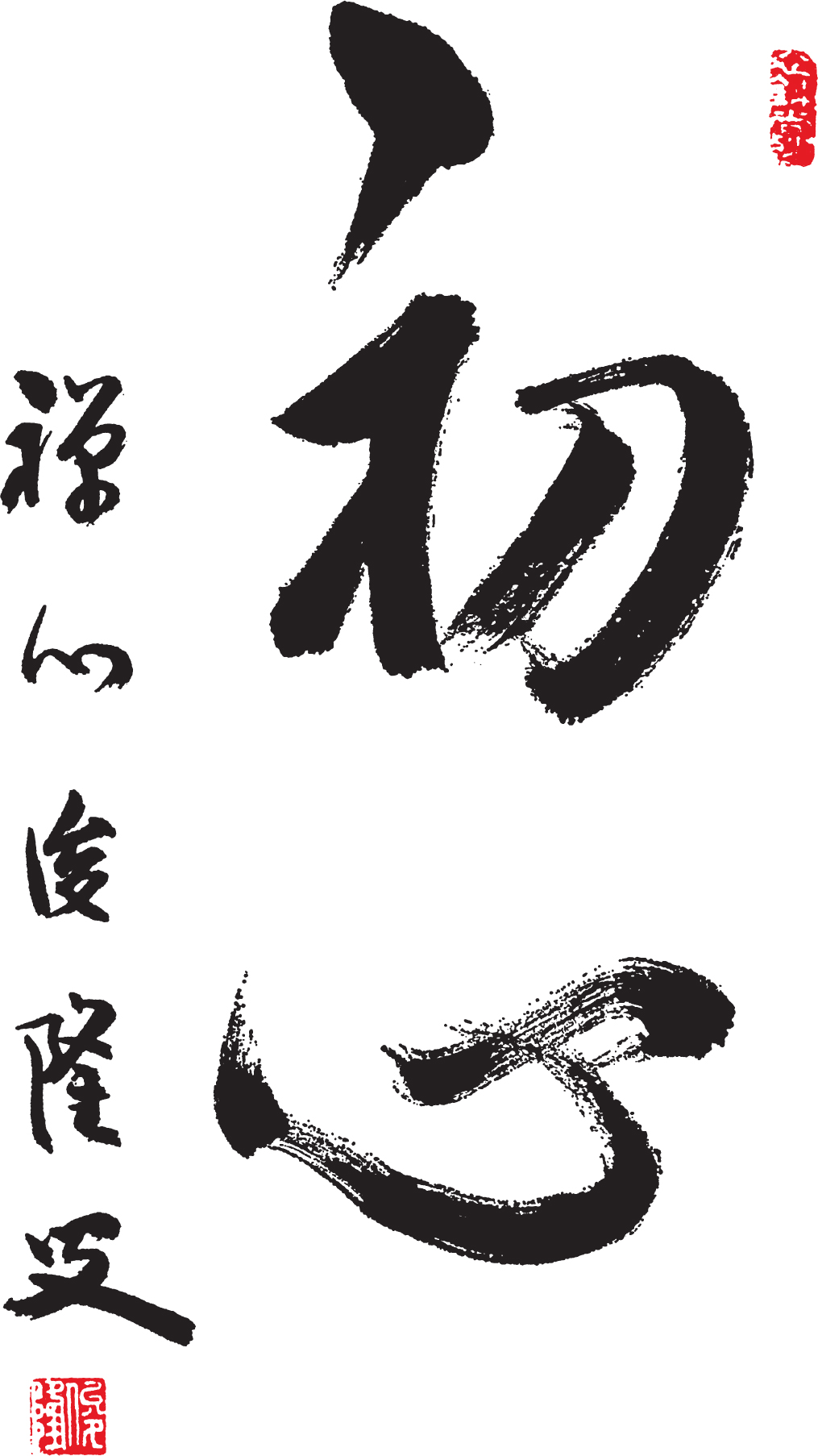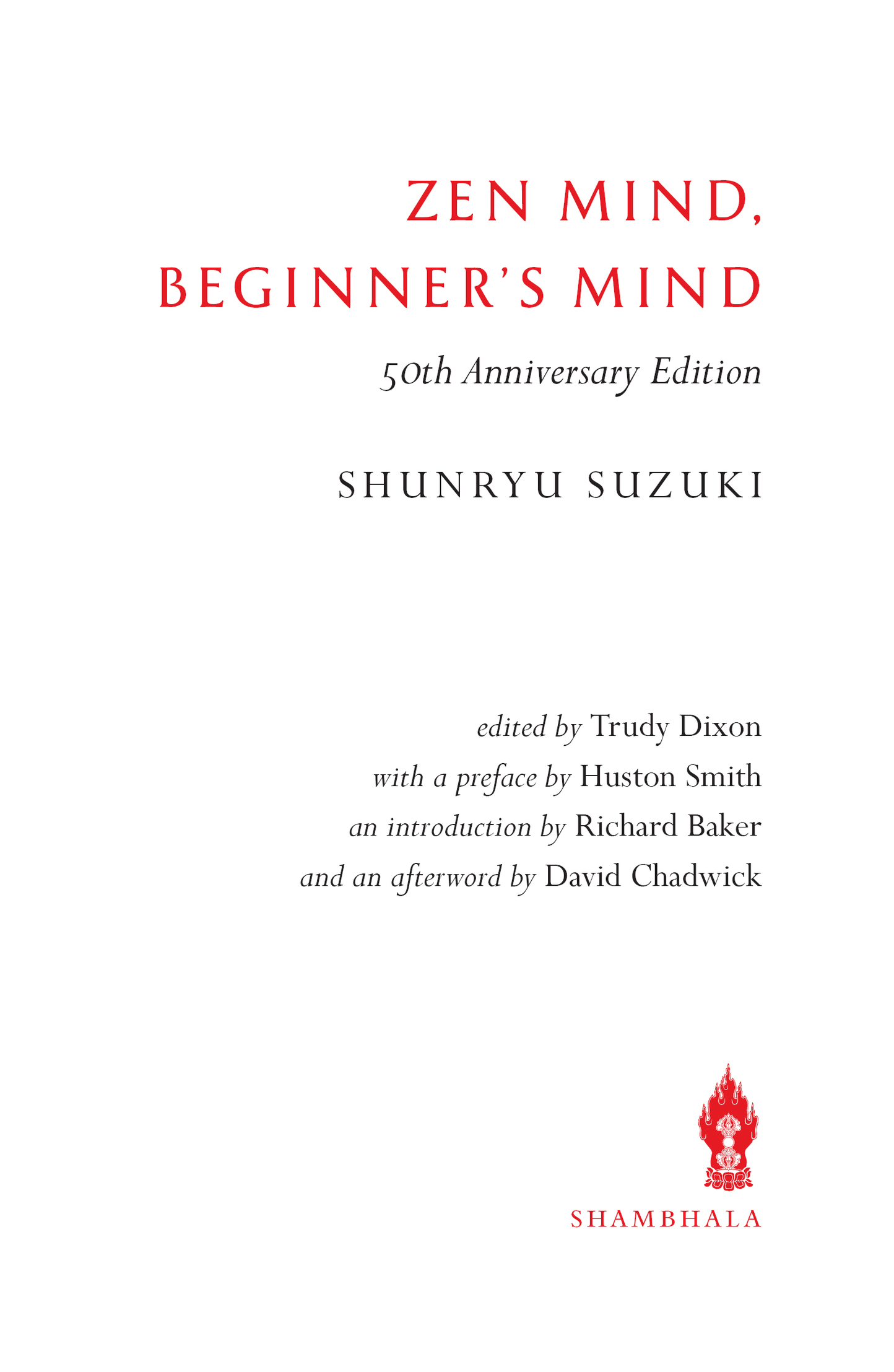Contents
Landmarks
Print Page List
F RONTISPIECE : T HE CHARACTERS FOR BEGINNERS MIND IN CALLIGRAPHY BY S HUNRYU S UZUKI .
Shambhala Publications, Inc.
4720 Walnut Street
Boulder, Colorado 80301
www.shambhala.com
1970 by John Weatherhill, Inc.
50th Anniversary Edition published in 2020.
Jaan Kaplinski, Shunryu Suzuki from The Wandering Border, translated from the Estonian by the author with Sam Hamill and Riina Tam. 1987 by Jaan Kaplinski. Reprinted with the permission of Copper Canyon Press, www.coppercanyonpress.org.
Cover art: Calligraphy by Shunryu Suzuki
Author photograph: Robert S. Boni
Cover design: Daniel Urban-Brown
Interior design: Lora Zorian
L IBRARY OF C ONGRESS C ATALOGING - IN -P UBLICATION D ATA :
Zen Mind, Beginners Mind
Names: Suzuki, Shunry, 19041971, author. |
Dixon, Trudy, 19391969, editor.
Title: Zen mind, beginners mind / Shunryu Suzuki;
edited by Trudy Dixon, with a preface by Huston Smith,
an introduction by Richard Baker, and an afterword by David Chadwick.
Description: 50th anniversary edition. | Boulder: Shambhala, 2020.
Identifiers: LCCN 2019051711
ISBN 9781590308509 (hardcover)
ISBN 9781590308905 (hardcover with slipcase)
ISBN 9781590308493 (paperback)
eISBN 9780834843011
ISBN 9781611808414 (50th anniversary edition)
Subjects: LCSH : MeditationZen Buddhism. | Zen BuddhismDoctrines.
Classification: LCC BQ 9288 . S 994 2020 | DDC 294.3/44435dc23
LC record available at https://lccn.loc.gov/2019051711
a_prh_5.5.0_c0_r1
TO MY MASTER
GYOKUJUN SO - ON - DAIOSHO
CONTENTS
PREFACE
T WO S UZUKIS . A half-century ago, in a transplant that has been likened in its historical importance to the Latin translations of Aristotle in the thirteenth century and of Plato in the fifteenth, Daisetz Suzuki brought Zen to the West single-handed. Fifty years later, Shunryu Suzuki did something almost as important. He sounded exactly the follow-up note Americans interested in Zen need to hear.
Whereas Daisetz Suzukis Zen was dramatic, Shunryu Suzukis is ordinary. Satori was focal for Daisetz, and it was in large part the fascination of this extraordinary state that made his writings so compelling. In Shunryu Suzukis book the words satori and kensho, its near-equivalent, never appear.
When, four months before his death, I had the opportunity to ask him why satori didnt figure in his book, his wife leaned toward me and whispered impishly, Its because he hasnt had it; whereupon the Roshi batted his fan at her in mock consternation and with finger to his lips hissed, Shhhh! Dont tell him! When our laughter had subsided, he said simply, Its not that satori is unimportant, but its not the part of Zen that needs to be stressed.
Suzuki-roshi was with us, in America, only twelve yearsa single round in the East Asian way of counting years in dozensbut they were enough. Through the work of this small, quiet man there is now a thriving Soto Zen organization on our continent. His life represented the Soto Way so perfectly that the man and the Way were merged. His nonego attitude left us no eccentricities to embroider upon. Though he made no waves and left no traces as a personality in the worldly sense, the impress of his footsteps in the invisible world of history lead straight on. His monuments are the first Soto Zen monastery in the West, the Zen Mountain Center at Tassajara; its city adjunct, the Zen Center in San Francisco; and, for the public at large, this book.
Leaving nothing to chance, he prepared his students for their most difficult moment, when his palpable presence would vanish into the void:
If when I die, the moment Im dying, if I suffer that is all right, you know; that is suffering Buddha. No confusion in it. Maybe everyone will struggle because of the physical agony or spiritual agony, too. But that is all right, that is not a problem. We should be very grateful to have a limited bodylike mine, or like yours. If you had a limitless life it would be a real problem for you.
And he secured the transmission. In the Mountain Seat ceremony, November 21, 1971, he installed Richard Baker as his Dharma heir. His cancer had advanced to the point where he could march in the processional only supported
by his son. Even so, with each step his staff banged the floor with the steel of the Zen will that informed his gentle exterior. Baker received the mantle with a poem:
This piece of incense
Which I have had for a long long time
I offer with no-hand
To my Master, to my friend, Suzuki Shunryu Daiosho
The founder of these temples.
There is no measure of what you have done.
Walking with you in Buddhas gentle rain
Our robes are soaked through,
But on the lotus leaves
Not a drop remains.
Two weeks later the Master was gone, and at his funeral on December 4 Baker-roshi spoke for the throng that had assembled to pay tribute:
There is no easy way to be a teacher or a disciple, although it must be the greatest joy in this life. There is no easy way to come to a land without Buddhism and leave it having brought many disciples, priests, and laymen well along the path and having changed the lives of thousands of persons throughout this country; no easy way to have started and nurtured a monastery, a city community, and practice centers in California and many other places in the United States. But this no-easy-way, this extraordinary accomplishment, rested easily with him, for he gave us from his own true nature, our true nature. He left us as much as any man can leave, everything essential, the mind and heart of Buddha, the practice of Buddha, the teaching and life of Buddha. He is here in each one of us, if we want him.
H USTON S MITH
Professor of Philosophy
Massachusetts Institute of Technology
From a tribute by Mary Farkas in Zen Notes, the First Zen Institute of America, January 1972.
INTRODUCTION
F OR A DISCIPLE of Suzuki-roshi, this book will be Suzuki-roshis mindnot his ordinary mind or personal mind, but his Zen mind, the mind of his teacher Gyokujun So-on-daiosho, the mind of Dogen-zenji, the mind of the entire successionbroken or unbroken, historical and mythicalof teachers, patriarchs, monks, and laymen from Buddhas time until today, and it will be the mind of Buddha himself, the mind of Zen practice. But, for most readers, the book will be an example of how a Zen master talks and teaches. It will be a book of instruction about how to practice Zen, about Zen life, and about the attitudes and understanding that make Zen practice possible. For any reader, the book will be an encouragement to realize his own nature, his own Zen mind.
Zen mind is one of those enigmatic phrases used by Zen teachers to make you notice yourself, to go beyond the words and wonder what your own mind and being are. This is the purpose of all Zen teachingto make you wonder and to answer that wondering with the deepest expression of your own nature. The calligraphy on the front of the binding reads

